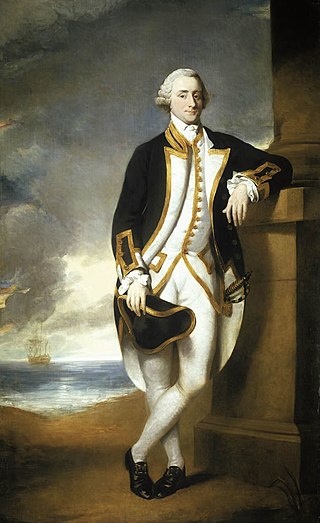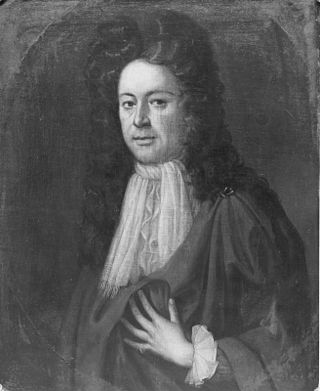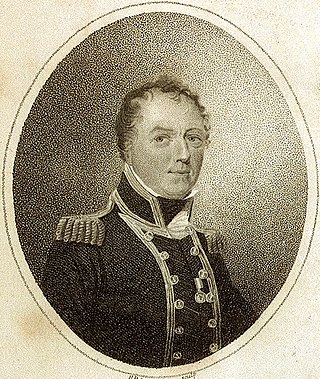Related Research Articles

Admiral of the Fleet Sir Cloudesley Shovell was an English naval officer. As a junior officer he saw action at the Battle of Solebay and then at the Battle of Texel during the Third Anglo-Dutch War. As a captain he fought at the Battle of Bantry Bay during the Williamite War in Ireland.

The siege of Derry in 1689 was the first major event in the Williamite War in Ireland. The siege was preceded by an attempt against the town by Jacobite forces on 7 December 1688 that was foiled when 13 apprentices shut the gates. This was an act of rebellion against James II.

Admiral Sir Hugh Palliser, 1st Baronet was a Royal Navy officer. As captain of the 58-gun HMS Eagle he engaged and defeated the French 50-gun Duc d'Aquitain off Ushant in May 1757 during the Seven Years' War. He went on to serve as Commodore Governor of Newfoundland, then Controller of the Navy and then First Naval Lord. During the American Revolutionary War he came into a famous dispute with Augustus Keppel over his conduct as third-in-command of the Channel Fleet at the inconclusive Battle of Ushant in July 1778; the dispute led to Palliser being court-martialled, although he was subsequently acquitted. In retirement Palliser became Governor of Greenwich Hospital.

HMS Dartmouth was a small frigate or fifth-rate ship, one of six ordered by the English Council of State on 28 December 1654, and built in 1655.
The Articles of War are a set of regulations drawn up to govern the conduct of a country's military and naval forces. The first known usage of the phrase is in Robert Monro's 1637 work His expedition with the worthy Scot's regiment called Mac-keyes regiment etc. and can be used to refer to military law in general. In Swedish, the equivalent term Krigsartiklar, is first mentioned in 1556. However, the term is usually used more specifically and with the modern spelling and capitalisation to refer to the British regulations drawn up in the wake of the Glorious Revolution and the United States regulations later based on them.

Admiral Sir Pulteney Malcolm was a British naval officer. He was born at Douglan, near Langholm, Scotland, on 20 February 1768, the third son of George Malcolm of Burnfoot, Langholm, in Dumfriesshire, a sheep farmer, and his wife Margaret, the sister of Admiral Sir Thomas Pasley. His brothers were Sir James Malcolm, Sir John Malcolm, and Sir Charles Malcolm.
Richard Kirkby was an officer of the Royal Navy during the eighteenth century. He rose to the rank of captain but was later tried at a court-martial for his conduct during the action of August 1702, and being convicted of cowardice and disobedience was executed by firing squad.

Captain Seth Jermy (1653–1724) was an officer of the Royal Navy, famous for fighting a particularly hard-fought action against an overwhelming French force while commander of HMS Nightingale.

Savage Mostyn was an officer of the Royal Navy who saw service during the War of the Austrian Succession and the Seven Years' War. He embarked on a political career, and was a Member of Parliament, Comptroller of the Navy, and one of the Lords of the Admiralty.

HMS Montreal was a 32-gun Niger-class fifth-rate frigate of the Royal Navy. She was launched in 1761 and served in the Seven Years' War and the American War of Independence. The French captured her in 1779 and she then served with them under the name Montréal. An Anglo-Spanish force destroyed her during the occupation of Toulon early in the French Revolutionary Wars.

Robert Fairfax was a rear admiral and politician.

Sir James Athol Wood CB, was an officer of the Royal Navy. After serving on merchant ships for the East India Company from a young age, he entered the Royal Navy in 1774. Wood served in the navy for almost his whole life, and took part in several of the wars fought by Kingdom of Great Britain throughout the eighteenth and nineteenth century. During his career he was involved in several personal conflicts and feuds, which resulted in him being the subject of two courts-martial.

Rear-Admiral Basil Beaumont (1669–1703) was a senior Royal Navy officer who was the fifth son, amongst the twenty-one children, of Sir Henry Beaumont, 2nd Baronet, of Stoughton Grange and Cole Orton.
Vice-Admiral Sir Charles Dashwood KCB was a distinguished British officer, who served in the Royal Navy during the American Revolutionary War, the French Revolutionary Wars, the Napoleonic Wars and the War of 1812. He had a long and prestigious naval career, gaining his own command by the last stages of the French Revolutionary Wars. He took part in a number of famous naval battles during his career, such as the Battle of the Saintes, the Glorious First of June and the Battle of Tory Island, where he received the sword of the French commodore, Jean Bompart. His record also includes extensive operations in the West Indies and the Baltic Sea, followed by the expedition to New Orleans in 1815.

Michael Bille (1680–1756) was an officer in the Danish Royal Navy during the Great Northern War. He was commissioned as a junior lieutenant in 1699, advancing steadily to become Vice Admiral when he retired in 1737.

Admiral Benjamin William Page was a Royal Navy officer of the eighteenth and nineteenth centuries who served extensively on the East Indies Station. He joined the Royal Navy in 1778 on board the flagship of Rear-Admiral Sir Edward Hughes, his patron. He sailed with Hughes to the East Indies and participated in the series of naval battles against the French that culminated in the Battle of Cuddalore in 1783. Page returned to England in 1785 and was promoted to lieutenant. His first appointment as such was in the frigate HMS Astraea commanded by Captain Peter Rainier. Rainier also became a patron of Page, who transferred with him to the ship of the line HMS Monarch in 1790 and then recommended him for further employment elsewhere. After another period of service in the East Indies, Page was again taken up by Rainier as a lieutenant, this time on the ship of the line HMS Suffolk, in 1793. Page served as Rainier's temporary flag captain in Suffolk and fought at the invasion of Ceylon in 1795 before being given command of the sloop HMS Hobart. In Hobart Page used his extensive knowledge of the East Indies to navigate Rainier's fleet to the Moluccas and Amboyna Island, which they captured.
Rear-Admiral Polycarpus Taylor was a Royal Navy officer of the eighteenth century, most notable for his service commanding ships in the West Indies during the War of the Austrian Succession. Having joined the Royal Navy some time before 1733, Taylor then served at the Battle of Cartagena de Indias and Invasion of Cuba before being promoted to commander in 1742. After commanding several vessels and being promoted to post-captain, in August 1744 Taylor took command of HMS Fowey; serving in the English Channel he ran ashore and destroyed the French privateer Griffon in 1745.
Captain Sir Andrew Leake was a Royal Navy officer of the late seventeenth and early eighteenth centuries, who distinguished himself at the Battle of Vigo Bay, during the War of the Spanish Succession. From Lowestoft, Leake joined the navy in 1688 under the patronage of John Ashby. Promoted to commander, Leake fought under Ashby as a supernumerary at the Action at La Hogue in 1692. His services at La Hogue brought him promotion to captain, and a series of commands that culminated in 1702 with Leake joining HMS Torbay. At Vigo Bay later that year Torbay broke the boom protecting a Franco-Spanish treasure fleet, resulting in the capture or destruction of the entire fleet. Leake was knighted for this, and went on to command HMS Grafton at the Capture of Gibraltar in 1704. He was mortally wounded at the Battle of Málaga later the same year.
Richard Griffith was a British Royal Navy captain.
Thomas Smith was a British Royal Navy captain and renegade.
References
![]() This article incorporates text from a publication now in the public domain : Laughton, John Knox (1888). "Douglas, Andrew (d.1725)". In Stephen, Leslie (ed.). Dictionary of National Biography . Vol. 15. London: Smith, Elder & Co.
This article incorporates text from a publication now in the public domain : Laughton, John Knox (1888). "Douglas, Andrew (d.1725)". In Stephen, Leslie (ed.). Dictionary of National Biography . Vol. 15. London: Smith, Elder & Co.